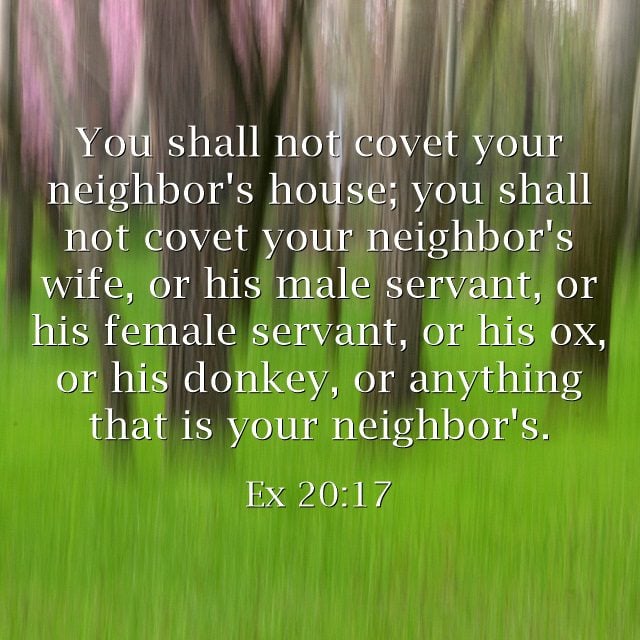What does the sin of covetousness look like in the Bible? How do we know when we’re being covetous?
What is Coveting?
If you looked at a secular definition of coveting, it means to have a longing for or strong desire for something and even someone else. It’s nearly like lusting in the heart for someone’s spouse, job, car, home, social status, or anything else of value. That is close to stealing in the heart like Jesus said lusting after someone is adultery of the heart. Of all the Ten Commandments, this is the only one that you cannot tell if someone is breaking it or not. Only God knows that.
The Tenth Commandment
God included as the Ten Commandments, “You shall not covet your neighbor’s house; you shall not covet your neighbor’s wife, or his male servant, or his female servant, or his ox, or his donkey, or anything that is your neighbor’s” (Ex 20:17). When we have a passionate desire for what others have, it is like telling God that you are not happy with what you have or telling Him, “God, why can’t I have what my neighbor’s got?” The truth is, if your neighbor is rich but lost, then all the wealth will be spent by someone else after he or she’s gone. They in turn, will spent all eternity separated from God. Why would you be jealous over what they have, knowing where they’re headed?
Coveting False God
God also warned Israel to not covet other nation’s gods and so warned, “The carved images of their gods you shall burn with fire. You shall not covet the silver or the gold that is on them or take it for yourselves, lest you be ensnared by it, for it is an abomination to the Lord your God” (Duet 7:25). Why would that be considered coveting by the Israelites? It’s because they would covet the freedom to sin that other nations had incorporated into their worship of pagan gods. Most of the so-called “religious services” were nothing more than drunken, sexual orgies. Some even resorted to sacrificing children in the fire. We might think that we’re not like ancient Israel and begin to worship foreign gods but our gods just come in different shapes and sizes. One might be a job; the other could be our children. It might even be the Internet. Whatever it is, it (the idol) has replaced God and the throne of God is a one-seater and it’s not for us.
Jesus on Coveting
When “Someone in the crowd said to him, “Teacher, tell my brother to divide the inheritance with me.” But he said to him, “Man, who made me a judge or arbitrator over you” (Luke 12:13-14) and then “said to them, “Take care, and be on your guard against all covetousness, for one’s life does not consist in the abundance of his possessions” (Luke 12:15). To explain the meaning more clearly, Jesus told them “a parable, saying, “The land of a rich man produced plentifully, and he thought to himself, ‘What shall I do, for I have nowhere to store my crops?’ And he said, ‘I will do this: I will tear down my barns and build larger ones, and there I will store all my grain and my goods. And I will say to my soul, “Soul, you have ample goods laid up for many years; relax, eat, drink, be merry” (Luke 12:16-19). Isn’t that what our world is like? We want to gather up as much wealth as possible in this life “But God said to him, ‘Fool! This night your soul is required of you, and the things you have prepared, whose will they be?’ So is the one who lays up treasure for himself and is not rich toward God” (Luke 12:21-22). What good will this man’s wealth do him on the Day of Judgement (Heb 9:27)? The point Jesus was making was “do not be anxious about your life, what you will eat, nor about your body, what you will put on. For life is more than food, and the body more than clothing. Consider the ravens: they neither sow nor reap, they have neither storehouse nor barn, and yet God feeds them. Of how much more value are you than the birds” (Luke 12:22-24). If a person is only interested in things, that is a life of covetousness. The goal for the believer is to seek the kingdom first and God will take care of all of their other needs (Matt 6:33) but this means seeking the King of that kingdom above all things, including possessions.
Conclusion
You can see why coveting is sin. It tells God that you are not satisfied with what you now have. Paul had to learn how to be content and wrote that “I have learned in whatever situation I am to be content” (Phil 4:11b) and “I have learned the secret of facing plenty and hunger, abundance and need” (Phil 4:12b). You can live two ways; with contentment or with discontentment. God will not bless the un-contented.
Article by Jack Wellman
Jack Wellman is Pastor of the Mulvane Brethren Church in Mulvane Kansas. Jack is also the Senior Writer at What Christians Want To Know whose mission is to equip, encourage, and energize Christians and to address questions about the believer’s daily walk with God and the Bible. You can follow Jack on Google Plus or check out his book Teaching Children the Gospel available on Amazon.












